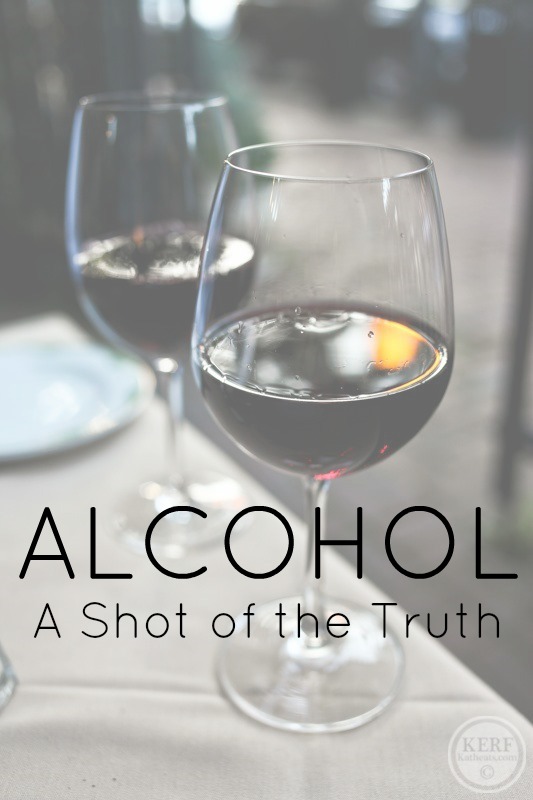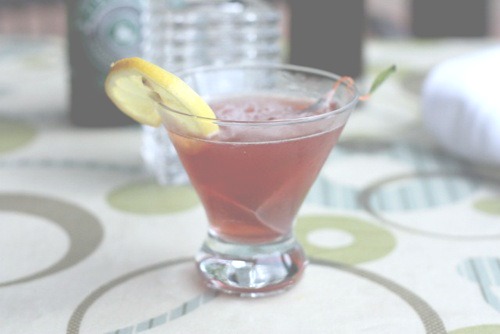As part of her week with me, I had Blake research and write a blog post about a nutrition topic. Her topic was one that is near to my heart mouth: alcohol. (I kid, sort of.) Take it away Blake!
Oh, alcohol. It seems that people either have very fond feelings towards you, or ones that are quite negative.
So often you hear of all the harm cause by alcohol consumption (ex. accidents and diseases), and just minutes later, you’re learning of its associated benefits (ex. a decreased risk of diseases). How do you sift through the influx of what seems like contradictory information? Let me help.
First, the basics. “Moderate” drinking refers to the consumption of less than or equal to 1 drink per day for women, and less than or equal to 2 drinks per day for men. This is the amount our bodies can properly break down in an hour’s time, and without holding a grudge against us. “Binge” drinking means more than 4 drinks per day for women, and more than 5 for men. It would be interesting if a study noted the implications of having between ~2-3 drinks per day, as many people probably fall into this category. Just to paint a clearer picture, a 12 oz beer has ~4-6% alcohol, a 5 oz glass of wine has ~8-14%, and a 1.5 oz jigger of liquor usually has 20%. These are all considered one drink.
Now, on to the more complicated stuff. Alcohol is absorbed along the gastrointestinal tract (mostly in the small intestine) via passive diffusion. The body focuses all of its attention on working to dispose of alcohol as soon as possible. 2-10% is excreted in our sweat, and by the lungs and kidneys. The remaining 90-98% is disposed of by metabolic processes, mainly in the liver. Alcohol dehydrogenase is the enzyme in the liver (with some also in the stomach) that breaks down alcohol. Women happen to make ~25% less of the enzyme than men do, which is one reason they often feel the effects of alcohol more quickly.
Let’s get to the good stuff! Red wine has had much attention surrounding its high antioxidant properties (specifically, resveratrol, bioflavonoids, and polyphenols), protection of blood vessels in the heart, and anti-cancer properties. However, studies have shown it may take up to 250 mg of resveratrol per day to see such benefits, and a glass of wine only has approximately 0 – 1.3 mg! Regardless, moderate alcohol consumption – not only wine – has been associated with stress reduction, mood elevation, increased sociability, and relaxation. I can get on board with that.
Additionally, moderate drinking has been shown to have an inverse relationship with heart attack, stroke, peripheral vascular disease, and death from cardiovascular events. It has also been correlated with higher levels of HDL (“good” cholesterol), insulin sensitivity (and, hence, protection against type 2 diabetes), and improved blood clotting.
On the opposite hand, chronic, binge drinking negates all of the good benefits alcohol can provide. It can cause inflammation of the liver (alcoholic hepatitis), scarring of the liver (cirrhosis), increased blood pressure (hypertension), and damage to the heart muscle (cardiomyopathy). It has also been associated with an increased risk of cancers of the head and neck, breast, colorectal, and liver. Chronic drinking can also cause serious respiratory problems, sleep interruptions, depression, anxiety, neuropathy, dementia, and Wernicke Korsakoff syndrome (a life threatening disorder of the central nervous system caused by alcoholics’ common deficiency in the B vitamin, Thiamine). Of course, heavy alcohol consumption hugely interferes with most medications, pregnancy, diabetes, and heart disease, just to name a few.
Moral of the story: like all things, moderation is key! Cheers to that.






Connie says
This is an interesting post. Is binge drinking really considered less than or equal to 4 drinks a day? That would mean that two drinks over the course of 24 hours is binge drinking? Maybe it’s not healthy, but I can’t imagine that’s considered a “binge.” Just curious. Thanks!
KathEats says
Sorry there was an error related to Word docs and special characters.
I have changed it to MORE THAN 4 and 5! Sorry for the confusion.
Shel@PeachyPalate says
The problem is most people have a different definition of moderation! As an Irish person living in Ireland I know how extreme the drinking is in here, and also the UK. Binge drinking is out of control. Forget five drinks in one go try 10+ and some people, a lot of young people, drink that amount 2-3 nights a week! I haven’t had a drink in a year because it just has a bad effect on my stomach but I think your attitude, Kath, towards alcohol is the “perfect” balance if there is one 🙂 You enjoy the taste, small amounts, you make the most of it when you do drink and don’t seem to over indulge to the point of your body hating you for it the next day. 🙂
Joanna says
I just got back from my routine oncology exam (seven years post diagnosis–stage IV inflammatory breast cancer). I asked my doctor if she considers me a high risk patient and she said I am not in the super high risk category in spite of my really bad original diagnosis because I don’t drink or smoke. I questioned her about the drinking part of that statement. She said that for cancer patients, studies show that more than four 5 ounce glasses a wine per week correlates with a higher risk of recurrence of cancer. She stressed that most people have larger glasses of wine than 5 ounces. I mentioned that she had never told me this before. She said that she discusses it with all her patients who drink and she advises to keep drinking to a minimum. This only pertains to cancer patients but I thought it was very interesting.
KathEats says
Thanks so much for sharing this…and best of luck to you xo
Michelle @lifetotable says
great blog post, Blake! I love the breakdown of what is considered to drink in moderation. Makes me feel a bit better when I want to enjoy some wine or a beer a few times per week 🙂
Caroline @ Broccoli Hut says
I agree with the previous commenters–this is a well-written blog post, Blake! I didn’t know that women produce less alcohol dehydrogenase compared to men. Gotta love nutritional biochemistry factoids!
Robyn says
One thing that is SO easy to forget is just how MUCH we’re drinking… When I go to my favorite bar in California, the beer glasses are larger than a serving of beer. So while you may pay for two glasses of Guinness, you’re probably consuming 3-4 … It’s a lot more than we think. Same thing with glasses of wine–when I see 5 oz. of wine poured, it’s usually far less than what appears in my glass when I order wine at a restaurant or absentmindedly pour for myself.
KathEats says
Great point!
Priya says
When I tell people I work to prevent excessive alcohol use, I typically get one of two responses: they assume I’m either working on college campuses or with people diagnosed with alcohol dependence. My response is always the same: Yes, those are important areas, but the problem is much bigger than that.
Regard’s
Priya Javia
Jess @ The Baguette Diet says
Thanks Blake for this reminder! Alcohol is a very sensitive subject for me. My beautiful, tiny, otherwise healthy mom was an alcoholic for around 5 years and actually passed away from the disease several months ago. I often wonder why alcohol seems to effect some people in different ways–there are plenty of “functional alcoholics” who drink heavily, sometimes for decades, but still manage to get by. I suppose there must be so many variables, though…genetics, diet, exercise, etc.
I really appreciate your reminder that alcohol in itself isn’t necessarily dangerous, as I often struggle with whether or not it’s ok to drink socially, given my family history.
KathEats says
I’m sorry for your loss Jess
Hannah @ eat, drink and save money says
Great post!
Moderation is definitely the key. Personally, I love stretching out a glass of wine through dinner prep and dinner each night (not while pregnant though, sigh). I used to feel like I drank too much because I enjoyed one 4 ounce pour of wine every night. I’ve finally gotten to the point where I am comfortable with that. It is a great way for me to wind down and definitely lowers my stress.
Jamie says
Hey Blake, great post! As far as your question about the implications of 2-3 drinks per day, studies have shown that there is a U-shaped curve when you plot drinks per day vs all-cause mortality (very similar to the relationship between BMI and all-cause mortality). One drink per day for women, two for men is correlated with decreased mortality as compared with not drinking, but once you go up to 2 and 3 and above, the protective effect appears to diminish. Here’s one study with some graphs: http://content.onlinejacc.org/article.aspx?articleid=1126214. What I’m not sure is if anyone’s been able to do a randomized controlled trial to study the long-term effects on alcohol and suggest causation versus merely correlation.
KathEats says
Thank you!
Sarah says
I think for one serving on liquor it should be 40%? Most liquors (vodka, gin, bourbon, tequila, etc.) are 80 proof, or 40%.
Cassie says
Oh, I don’t think I could ever drink if my life depended on it X(